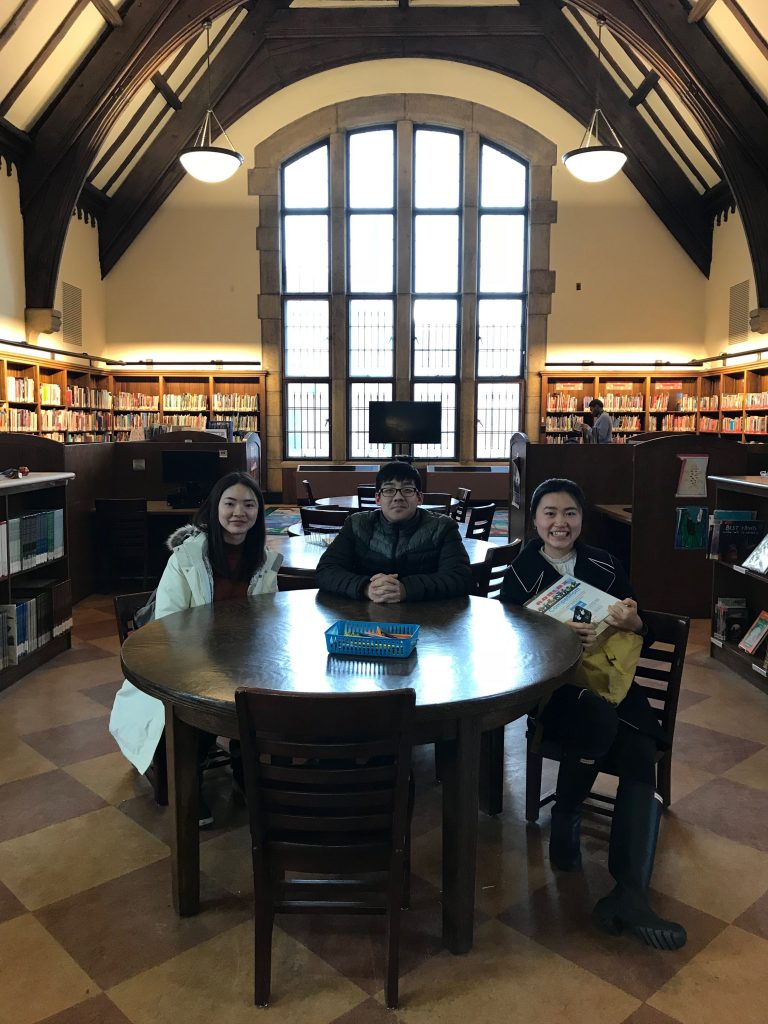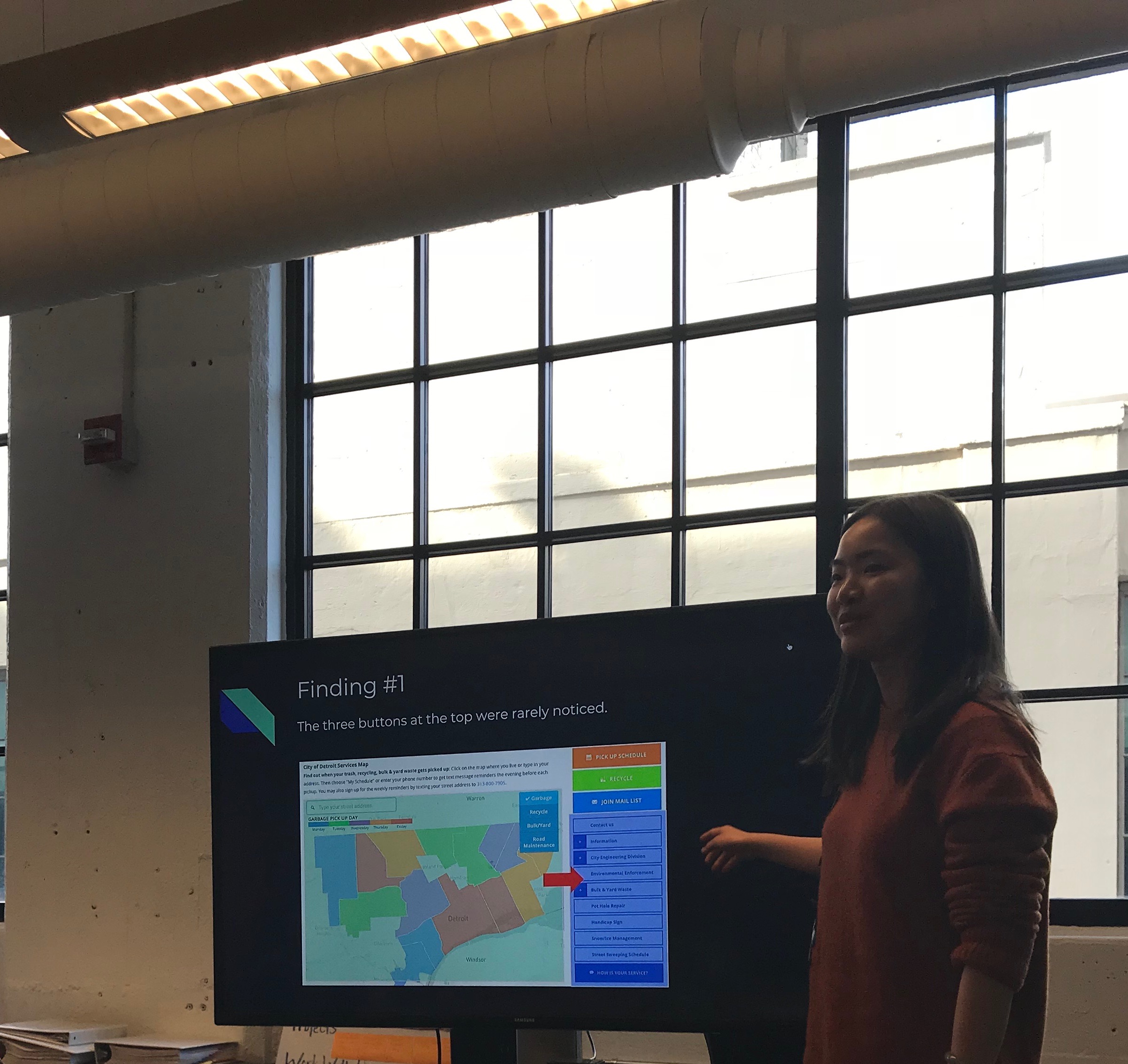How can we improve digital services provided by the government?
 In Detroit, Data Driven Detroit (D3) is partnering with the City government to answer that question — and three students from the University of Michigan’s School of Information used their spring break this year to help. Hyorim Kim, Mengzhu Ouyang, and Puhe Liang took part in an alternative spring break program designed and facilitated by Microsoft Civic Tech Fellow Meghan Urisko and D3 to help the City of Detroit improve their Public Works Tool. The students ran a mini-version of a CUTGroup, or Civic User Testing Group.
In Detroit, Data Driven Detroit (D3) is partnering with the City government to answer that question — and three students from the University of Michigan’s School of Information used their spring break this year to help. Hyorim Kim, Mengzhu Ouyang, and Puhe Liang took part in an alternative spring break program designed and facilitated by Microsoft Civic Tech Fellow Meghan Urisko and D3 to help the City of Detroit improve their Public Works Tool. The students ran a mini-version of a CUTGroup, or Civic User Testing Group.
Since 2016, Data Driven Detroit has partnered with the Microsoft Cities Team to develop CUTGroup, helping The City of Detroit and other community technology providers evaluate the usability of their digital tools by testing their functionality with residents who are representative of the diverse levels of digital literacy in Detroit. The students focused their efforts on the Detroit Public Works Tool’s interactive map, which helps residents know their trash, bulk trash, and recycling pickup schedule. Users were able to provide feedback on what worked or didn’t, they can best use the city’s site, and what existing tools are available to them.
The Alternative Spring Break team spent their time performing a heuristic evaluation of the tool, developing user tests to identify other usability issues, and developing suggestions that were feasible for the City to implement. They also visited the Parkman Branch of Detroit Public Library to recruit residents for the CUTGroup database and performed their usability tests with Detroit residents. They turned their results and recommendations into a report so the City can use their research.
“I was expecting residents to quickly understand what CUTGroup is and the purpose it serves,” explained Kim, a senior studying Information. “This experience reminded me that there is a vastly diverse group of people all with varying levels of technical experience and literacy. After this experience, I will always be accountable to myself to keep an even more-inclusive mind when designing for anything.”
The CUTGroup test was quick to identify issues that users of all skill levels would face on the city’s website. One major issue was the use of jargon, prompting designers to recommend plain language that all residents could understand. Users also noted that some language on navigation bars and dropdown menus was ambiguous. Valuable insights from civic users show us the importance of CUTGroup; the priority in designing digital services is ensuring these services work for their users.
“Designing interfaces and tools to be more accessible for the diverse groups of residents will pave the way towards higher levels of civic-participation and digital equity within communities,” Kim said.
CUTGroup allowed the students to follow a user’s journey on the City of Detroit’s Department of Public Works tool and ultimately identify user’s pain points and validate heuristic problems discovered during usability tests. Their findings and recommendations will help the City improve the tool’s user experience and better serve its residents.

“I recently came across a quote related to the design and development of civic technology: ‘for the people and by the people.’ It really spoke to me, especially after my experience with CUTGroup in Detroit,” says Kim. “The design and development of civic-centered user testing technology has been swept under the rug for far too long. Civic-user testing should be the beginning of the design process for all civic technologies as residents are their primary users.”
In the past, the City of Detroit, D3, and Microsoft have partnered to evaluate the Improve Detroit App, which helps residents report issues in their community to the correct agency as quickly as possible. As the City of Detroit continues to develop new digital tools to serve residents, D3 and Microsoft are committed to continuing the CUTGroup partnership.
“CUTGroup testing has become a critically important part of the process whenever D3 or the City develops a tool for community use,” explains Noah Urban, Senior Analyst, Data Driven Detroit. “The feedback from residents helps us make sure that these tools are accessible and functional for the people who are actually the intended audience. Our partnership with the City has been invaluable for us in this project, and we look forward to our continued partnership that will allow us to use the feedback from CUTGroup tests to improve both the City’s and D3’s tools and technology in the future.”

